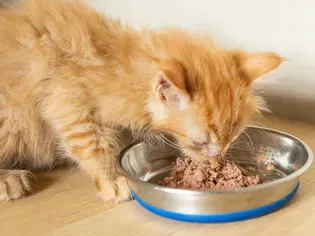Choosing the Best Food for Kittens
Updated on 05/26/24

Choosing the Best Food for Kittens: A Comprehensive Guide to Ensuring Feline Well-being
Introduction
From their playful antics to their adorable cuddles, kittens bring immense joy into our lives. As responsible pet parents, it's crucial to provide these tiny felines with the best possible nutrition to support their growth, development, and overall well-being. Choosing the appropriate food for kittens is not merely a matter of convenience; it's an investment in their future health and happiness.
Understanding Kitten Nutritional Needs
Kittens, like human infants, have unique nutritional requirements that differ from adult cats. Growing kittens need a calorie-rich diet to fuel their rapid growth and energy expenditure. They also require specific nutrients, such as proteins, fats, carbohydrates, vitamins, and minerals, in balanced proportions.
Choosing a High-Quality Kitten Food
When selecting a kitten food, it's essential to focus on quality rather than price. Look for brands that meet the Association of American Feed Control Officials (AAFCO) nutrient profiles forkitten growth and development. These profiles ensure that the food contains the appropriate levels of essential nutrients.
Consider the following factors when evaluating kitten foods:
1. Protein: Kittens require a high proportion of protein in their diet, around 30-50%. Look for foods that list animal proteins, such as chicken, fish, or lamb, as the primary ingredients. Avoid plant-based proteins, as they are less digestible and nutritious for kittens.
2. Fat: Fat provides Kittens with energy and supports the absorption of vitamins and minerals. Choose foods that contain 10-15% fat, ensuring a balance that promotes growth without excessive weight gain.
3. Carbohydrates: Kittens can digest small amounts of carbohydrates, which provide energy. However, they are not a primary energy source and should be present in moderate levels.
4. Vitamins and Minerals: A complete kitten food should contain all the essential vitamins and minerals necessary for optimal growth and development. Look for foods that include taurine, an amino acid vital for heart and eye health.
5. Ingredient List: Carefully read the ingredient list to ensure the food is free from artificial fillers, additives, and preservatives. High-quality kitten foods will prioritize whole, natural ingredients that support feline health.
6. Form and Texture: Kittens may prefer wet food or dry food, or a combination of both. Wet food provides hydration, while dry food helps keep teeth clean. Choose a form that your kitten enjoys and promotes healthy eating habits.
Examples of Reputable Kitten Food Brands
* Royal Canin Kitten
* Hill's Science Diet Kitten
* Purina Pro Plan Kitten
* Blue Buffalo Wilderness Kitten
* Merrick Backcountry Kitten
Transitioning to Kitten Food
If you are adopting a kitten that has been weaned from its mother's milk, it's crucial to gradually transition them to a kitten food. Start by mixing a small amount of the new food with the kitten's milk replacement or current food. Gradually increase the proportion of kitten food over several days until the kitten is fully transitioned to the new diet.
Monitoring Your Kitten's Growth and Development
Once your kitten is eating a high-quality kitten food, monitor their growth and development closely. Weigh your kitten regularly and consult with your veterinarian to ensure they are gaining weight and growing at an appropriate rate. If you notice any changes in your kitten's appetite, energy levels, or behavior, consult your veterinarian promptly.
Conclusion
Choosing the best food for kittens is an important decision that lays the foundation for their lifelong health and well-being. By understanding their unique nutritional needs, selecting a high-quality kitten food, and monitoring their growth and development, you can provide your furry companion with the nourishment they deserve. Remember, a happy and healthy kitten is a testament to your love and care as a responsible pet parent.
Explore More Pets

Cat Behavior Problems
How to Stop Aggression in Kittens

Long-Haired Cat Breeds
Siberian Cat: Breed Profile, Characteristics, & Care

Cat Behavior Problems
How to Stop Kittens From Scratching and Biting

Long-Haired Cat Breeds
Turkish Angora: Cat Breed Profile, Characteristics & Care

Basic Training
How to Socialize Your Kitten

Short-Haired Cat Breeds
Cute Pictures & Facts About Calico Cats & Kittens

Litter Box Training
Training Your Kitten to Use the Litter Box

Long-Haired Cat Breeds
10 Fun Facts About White Cats
